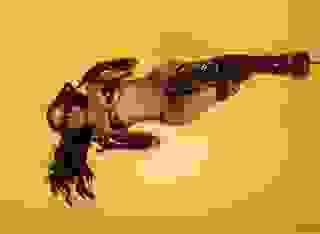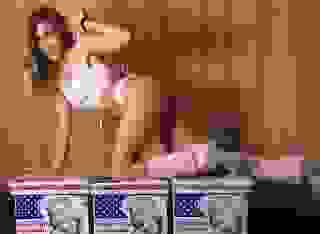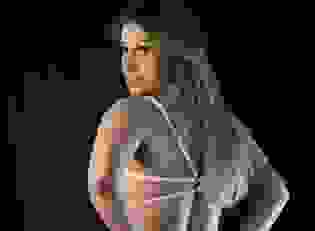Note: You can change font size, font face, and turn on dark mode by clicking the "A" icon tab in the Story Info Box.
You can temporarily switch back to a Classic Literotica® experience during our ongoing public Beta testing. Please consider leaving feedback on issues you experience or suggest improvements.
Click here"I wonder if George Church and his team could bring back the Cave Lion someday," I said as we motored upriver.
"I don't think a predator is a priority for the restoration of the grasslands," Nicole replied. "It's a pipe dream to think we'll ever have herds of wooly mammoths roaming the tundra again."
"What do you mean?" I'd worked with the team, and it was exciting. "The theory is that the African elephant is close enough genetically that you could make forty or so DNA edits and get an animal that is very similar to the wooly mammoth we just found. The better the samples, the easier it is to map the genome."
Nicole just shook her head. "What killed the mammoths, Mr. Cantwell?"
"The prevailing theory is human overhunting," I replied. "Although the changing climate conditions would also stress the existing herds."
"I'm a pessimist because adult mammoth tusks are worth so much, and it's so easy to kill and take them. We're fighting to sustain African Elephant populations in the face of the black market ivory trade. Poachers are wiping rhinos out because powdered rhino horn as a supposed cancer treatment makes it as valuable as gold. People are here, and they can kill mammoths faster than we can grow replacements."
The depressing thing was that she was right. "It won't be easy, but first we have to create them, then get enough to create a self-sustaining population. Still, how much would you love to see a herd of them grazing again? Or seeing a cave lion pacing about, even in a zoo? I would retire a happy man if that happened."
Dinner was waiting for us when we got back to base camp. After wolfing down my meal, I returned to my tent, removed my sweaty clothes, and put on sleeping clothes. I downloaded the photographs and measurements I'd made onto my laptop, then got into my sleeping bag.
I'd need rest for our next shift.
Ch. 4
It was light out when I woke, just like when I went to sleep. That's summer above the Arctic Circle for you.
The arrival of the swing shift team and their conversations is enough to get me out of bed. I joined them at the tables as they ate; they were bone tired yet excited. "How far did you get?"
"Here," one of the graduate students told me as he pushed his phone across the picnic table. "I took this when we stopped for turnover."
The high-resolution photographs showed their progress; they had uncovered the mammoth as far as the front legs and up to the neck. "And take a look at this." He showed some close-up shots of the front legs. Just above the kneecap was a section of torn flesh. My jaw dropped. "Is that?"
"A bite wound. No doubt about it from the symmetry of the damage. This mammoth was attacked by one or more cave lions just before it died. We'll find out soon, but I'm confident that the lion underneath it died during the attack."
What a find this was becoming! Could you imagine the taxidermists recreating the scene? It would be amazing. "You guys are close. Do we know how we're getting it out yet?"
"Vitali said to 'trust him.' I don't know what he's planning, but this thing is freakin' huge." I looked through the other photographs he'd taken as he finished eating, air-dropping the best ones to my phone. I gave it back as they headed to their tents to get some sleep.
The bugs were thick, so I headed back to my tent and looked at the photos there. I fell back to sleep eventually, waking in time for breakfast. Vitali had come back with the swing-shift crew to get some sleep, but he was up and ready to head out with us. So we gobbled breakfast, eager to return to the site.
On the way there, I asked Vitali how we were getting the mammoth out. I figured that by the time we arrived, the nightshift crew would have the mammoth freed from the surrounding permafrost. "You said you are getting a helicopter; are we cutting a hole in the roof?"
"No; the mammoth is a good ten meters below the hillside, and any vertical shaft we create might collapse inward as the permafrost melts. We can't risk it getting crushed. You'll see my plan when I get there."
We arrived at Cave Three, and the night crew was waiting for us. "What's with the chest waders," I asked them as they walked out to the boat.
"They're for you," one of them replied. "We timed this perfectly to avoid the sucky part."
Vitali laughed as he pulled a set on over his warm clothing. I looked up at the cave entrance to find it was blocked chest-high with sandbags. "What is the best way to move a heavy object from point A to B," he asked.
It hit me immediately. "Float it," I said.
"Exactly. We're going to flood the tunnel nearly to the top, then cut the carcass free and pull it out. Since it will be partially underwater, moving it will be much easier than it would be otherwise."
The cave sloped gently upward to keep the water flowing back to the river. "You won't have enough at the back."
The expedition leader nodded. "That's why we are building another dam closer to the mammoth. We need a lot of water to float it free without damage. Once we can move it, we can almost flush it out of the cave."
"What about the cave lion?"
"The riskiest part of this whole thing is moving the mammoth off of the lion. Partially floating the carcass will remove some of the weight; since the cave lion is still encased in permafrost underneath and frozen, it's our best chance to avoid further damage."
"It's not going to be easy. We need to maintain some supports for the mammoth to hold its weight off the cave lion while the water gently separates the two. Then we need to cut the mammoth loose while the tunnel is flooded high enough to do this. I have some divers coming in with dry suits; they will make the final cuts when we are ready."
It was a hell of a plan. Once out of the cave, we'd attach lifting straps and a big net. A heavy-lift helicopter would move it to the White Mountain Airport in Belaya Gora. From there, a Russian military transport would fly it to the University of Moscow.
The tricky part was the messy work to undercut the mammoth without breaking off a chunk of the frozen animal or damaging the lion underneath. The three of us worked past lunch, leaving columns of frozen mud to support the weight as we cut passages underneath. Vitali checked our work and agreed it was time to flood the room.
The other workers had put together sandbag dams in preparation for flooding the passageway. The first one was two-thirds of the way in, the second at the cave entrance. We turned all the hoses on and started to fill the pond. Nicole and I stayed in waders, walking around the mammoth and watching for any problems.
When the water got above waist level, we were out of there. The two divers in their dry suits replaced us. We'd taken pictures of where the frozen support columns were, but they'd have to finish cutting it free by feel. The cold, muddy water was like working blind.
We started filling between the first dam and the entrance while the divers went to work with the small hoses and wands. We had water to our thighs when we heard the shouts from the divers. "это бесплатно! (It is free)!"
Sure enough, the mammoth was floating like a single ice cube in a glass. The divers slowly maneuvered the carcass until it was next to the temporary dam. We tied off ropes to the legs and neck that led back to the river.
Once the water level in the lower portion was almost up to the upper level, we worked with the divers to dismantle the dam. The men on the ropes slowly pulled the mammoth down the tunnel, skidding it over the frozen floor where the water wasn't deep enough to float it.
It was four in the afternoon when the mammoth reached the dam at the cave entrance. When ready, boats with attached ropes pulled the sandbag dam down, and the mammoth shot out of the cave like it was on a waterslide. It stopped near the river, exposed to sunlight for the first time in perhaps ten thousand years.
It was beautiful.
"Go get some rest," Vitali said as he clasped my shoulder. "Tonight will be busy with getting this animal on the plane. Then, tomorrow, we go after the Cave Lion."
Ch. 5
The following day I couldn't wait to get back to the site.
We almost missed it.
The Cave Lion was intact, and crews on swings and nights had nearly freed it from the surrounding soil. However, it was much slower going, as they were digging a pit that would fill up with the water they used to blast the frozen ground away. In addition, the fur and hide weren't as thick and tough as the mammoth had been, so they needed to use smaller nozzles and lower pressure spray. They also had to dig a sump down to collect the water and rig a submersible pump to remove the water as it collected. Unfortunately, you can't use a gas pump inside the cave, so the crews set up a portable generator and ran extension cords.
Our crew had the slowest and most demanding job; since the cave lion had been submerged and wasn't as thick, the prolonged exposure to warmer air and river water was thawing it out as we worked. Working from back to front in the narrow channel around it, we had to bring wood planks to stabilize it as we undercut the body. It was slow, messy, and cold work. Finally, I cut through the last section of mud just before lunch, and it was free.
The specimen was in great shape despite having been landed on by a six-ton mammoth. It was intact, although the right front leg and multiple ribs appeared broken. It must have landed in water or soft mud, which was lucky for us. It was an impressive animal, bigger than the African lions I'd seen in zoos. It looked very similar, except this male didn't have a long mane, and the fur was thicker and lighter in color. We measured it at 2.54 meters (8 ft 4 inches) long and estimated its weight at 350 kg (771 pounds).
He was one intimidating predator; paws the size of dinner plates, claws longer than my finger and still sharp, and a mouth big enough to engulf my head.
Luckily, removing this specimen would be much simpler. We brought in straps and every person we could round up and used six lift points to move him. We went slowly due to the cramped quarters and slippery ground, letting him down a few times to rest. When we exited the cave, one of the expeditions' flat-bottomed riverboats was waiting with a tarp already prepared. Walking across the muddy riverbank like we were casket bearers, we positioned the lion on the boat and set it down. "Set the straps down along the outside, and cover it with the tarp."
We did so, knowing the hot sun would be accelerating the thawing and the decay.
The prospectors were happy we finally finished our work; they'd lost two days of prospecting to this. The expedition would pay them for their labor, but they might have made more continuing their quest for ivory without it. They weren't even getting the tusks from this animal; since it was such an important specimen, the Russian Government was buying the tusks from them, kind of an "as-is-where-is" deal.
Vitali chose Nicole and me to ride back with him to Belaya Gora with our Cave Lion. My expedition leader and favorite professor climbed on board and went to the back of the thirty-foot boat, where a local fisherman was at the tiller of his outboard motor. "Stay in the front and try to keep him from getting wet," Vitali told me.
I needed help to push us off the muddy riverbank since the boat now weighed fifteen hundred pounds more than it did when it landed. As it broke free of the muck, I clambered on board and found a place near the cave lion's head to sit down.
You couldn't get the smile off my face as we turned upriver and started to move. Nicole was the same way; we had done it; we'd been part of a find that would send shock waves through the world of paleontology. First, the two carcasses would be sampled, x-rayed, examined, measured, and autopsied to determine all we could about them. Then, when the autopsy was over, samples would be taken and distributed to universities worldwide. DNA samples would go to Harvard, I was sure.
After all that? I expected to see two teams of taxidermists taking on the challenge of a lifetime. The preserved fur and bodies would end up in a Moscow museum. They would show the next generation of young children the wonders of the Ice Age era, thanks to the permafrost and our expedition.
The outboard was pushing us slowly upriver, and the wind was warm. I took off my gloves and cap for the first time since lunch; the water was so cold that you'd be useless in a minute without the insulated and waterproof gloves and clothing we wore. I set them by my leg right for now. The warm breeze felt fantastic on my face and hands; working in the frozen underground made you appreciate the simple things in life. I closed my eyes, letting myself enjoy the moment.
I opened my eyes just as a gust of wind blew the tarp away from the cave lion's head.
I got on my knees, crawling over to grab the tarp and pull it in place. As I looked down, I realized that I'd never touched the specimen without gloves; hell, none of us had! The temptation to feel the wet fur and teeth of an extinct animal was too much to resist. I leaned down, holding the tarp with one hand while the other moved to touch the fur at the side of his face.
My fingers touched the fur, and it felt like a jolt of electricity surged through my body. I could have sworn the lion's eyes glowed red, but then the pain hit. I couldn't move, I couldn't scream, I couldn't breathe. My body froze in terror, the adrenaline dump useless against this. My stomach trying to throw up but unable to.
The pain wasn't enough to keep me from feeling something pushing into my consciousness.
Then the pain was too much, and everything went black.
Ch. 6
My mind felt like it was underwater. Everything was fuzzy and dark. Dreams came and went as I tried to push myself to the surface; images of blood, screams, and water. I could hear something out there, rhythmic, like a beep. I used that to focus on, trying to clear the webs from my mind.
Beep. Beep. Beep.
My hearing improved, but with consciousness came the pain. Everything hurt down to my bones. I pushed to wake up at the same time I begged for the relief that came with sleep. Finally, I managed to get my eyes open, only to close them again against the bright light. I turned my head to the side, every inch sending pain through my body, before opening them again.
White. Everything was fuzzy and white. I blinked a few times, and my vision cleared enough to see the bed rail, the wall, and the IV stand.
I was in a hospital.
I tried to speak, but nothing came out. I concentrated, forcing my right hand to move. I heard metal rattle, and then my hand couldn't go any farther. I tried my left hand, and it was the same. I took a glance and recognized the problem.
Handcuffs. They handcuffed my wrists to the hospital bed.
"он проснулся," a woman's voice said.
I tried to talk, but nothing came out. Then, finally, a nurse came into view, holding a cup with a straw. I took a drink, the warm water calming my aching throat. "Thank you," I whispered.
I heard the door open to voices speaking in Russian, then the sound of footsteps as several people came into the room. I blinked my eyes again to clear my view but left my head where it was. It still hurt to move. One man, one of those barrel-chested Slavs with no neck and dressed in a suit with a badge on a chain around his neck, stayed by the door while two others approached in their lab coats. The last man in the room gave me a quick nod, then took his cheap suit to the wall on the other side of the door from the badge guy. "Welcome back," he said in accented English. "I am Doctor Novoritsky, your doctor. Next to me is Doctor Kalenkov, our Chief of Neurology. Can you tell me your name?"
"John... John Cantwell," I said softly. "Where?"
"Can you tell me what year it is?"
"2021."
"Good." He took out a penlight and checked my pupils, then did some basic checks for motor function and sensation, things like running a pen cap over the soles of my feet to check for a response. He kept telling me what he was doing and why but never answered the basic questions I had. I felt shooting pains and cramps every time he manipulated a limb. The man by the door was staring at me like I deflowered his underage daughter and looked to be enjoying the pain I was suffering. I wasn't feeling the love in the room, and I didn't know why. "How do you feel?"
"Like I got run over by a truck," I said. "Where am I?"
"Moscow, the Central Clinical Hospital."
Moscow? "What... why?"
"You were airlifted to a hospital in the Sakha Republic, suffering from hypothermia and in a coma. While they were successful in raising your core temperature, you didn't respond to treatment. Your father pulled some strings to have you transferred here. You are lucky your father has friends in Russia."
Two hospitals? "How long was I out?"
"Six days," he told me. "You have made good progress, Mr. Cantwell." The neurologist left, and then Doctor Novoritsky turned to the man with the badge. "He appears to be lucid enough for a short interview, Investigator Kaprisov. I will have a nurse monitoring him from the station; if it starts to threaten his recovery, I will shut it down."
"I understand," Kaprisov said in a low, gravelly voice. He waited for the doctor to exit the room before he moved, pulling a chair noisily across the floor until it was next to my head. "I am Senior Investigator Viktor Kaprisov of the Central Investigation Department."
"The what?"
"It is the Russian equivalent to your Federal Bureau of Investigation. The man by the door is a public defender. He is here to represent you."
If Viktor was law enforcement, he was keeping the cuffs on me. I rattled the one on my left wrist. "What is this about?"
"It's a precaution while we continue our investigation of the incident."
"What incident?" Couldn't he tell me what the hell was going on?
"The last time your comrades at Cave Three saw you, you were leaving with the Cave Lion specimen on the boat. Tell me what happened after you left."
I'd seen enough legal dramas on television to know this was a bad idea. Something terrible happened, and the cuffs on my wrist told me I was their suspect. The fact that I was American was a bonus. "I'd like to speak to my lawyer first," I said.
"Why? If you are innocent, surely there is no need to get the lawyers involved. I'm here to find out what happened on the river."
They always said that. "And I'll be happy to answer questions if advised to by my lawyer."
"You sure about this?" He shook the handcuffs. "All you have to do is answer my questions, and this can go away."
"Good idea. Go away, and let me speak to my lawyer in private."
He sat back, fixing me with a stare. "Fine. I will be outside."
He said something to my lawyer, then left. The lawyer came over by my side. "Здравствуйте, я Анатолий Беленков, ваш адвокат."
I'd been in Russia for a few weeks, but it wasn't like I knew the language. "You lost me after hello." The conversation went downhill from there; he didn't know English, and I didn't know Russian. "Embassy," I finally told him. "United States Embassy." Maybe he understood, but I didn't know. I laid my aching head back on the pillow. "Doctor, пожалуйста." I'd picked up the words for 'please' and 'thank you,' at least.
The lawyer left, and a minute later, Doctor Novoritsky came back in with the investigator on his heels. "My lawyer doesn't speak English, and I don't speak Russian. Please contact the United States Embassy about arranging proper counsel," I told them both.
"I spoke to your father just now to inform him of your change in status. When I told him the CID was here to take your statement, he swore and said he'd be talking to the embassy right away."








